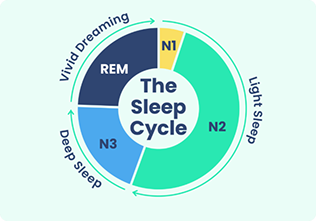
Module 3:
Vaping and Mental Health
When someone vapes, they are at a higher risk of struggling with mental health challenges like anxiety and depression. It also affects how the brain works, including its development and sleep patterns. Since brain growth and good sleep are important for mental health, vaping can make it harder to feel your best. This module will cover vaping and its overall effect on the brain and its connection to poor mental health.
Myth vs. Fact
For many teens, vaping becomes popular because friends or peers use it at school, home, or social events. It’s often seen as the “cool” thing to do. But many teens don’t realize the real dangers.
Big tobacco and vape ads make it even harder to see the truth, marketing vapes as fun and harmless, but in reality, these tactics hide the serious health issues that come with vaping.

Don’t be fooled – in this next activity read the myth and see if you can identify the truth!
Click to reveal the correct answer!
“Vaping helps reduce stress and anxiety.”
Myth
“Nicotine can make it harder to focus and manage emotions.”
Fact
Teen brains are more at risk of getting addicted to nicotine and THC because they’re still growing and don’t fully develop until around age 25.”
Fact
“Vaping can decrease a good night’s sleep”
Fact
“Vaping to cope with depression is healthy for mental health”
Myth
Anxiety and Depression
Vaping does not help reduce anxiety and depression! This myth is sometimes believed to be true because of short term changes nicotine and THC have on the brain and body. But these effects don’t last and in the long run can make mental health worse.
Why some people think vaping helps:
Vaping nicotine gives a quick boost. When nicotine enters the brain, dopamine is released, which creates happy, pleasant feelings. The body’s response feels like a surge of adrenaline and speeds up the heart rate.
Vaping THC alters the part of the brain that controls pleasure, memory, and judgement. It can create feelings of relaxation, laughter, hunger, and euphoria (a state of excitement and happiness).
The Reality:
These short “positive” reactions are misleading and over time become harmful. Research shows that youth who vape, are more likely to feel anxious, experience panic attacks, and are 2x more likely to be diagnosed with depression.
You can learn more about the impact of vaping on mental health by watching the video below.
Your Brain and Learning
Just like a teens’ body goes through big changes during puberty so does the brain. During these years, the brain processes information from its middle brain (amygdala). Remember back to module 1, the amygdala is the emotional controller of feelings. At this stage, emotions not only feel more intense, but it’s difficult to think logically. Now, imagine adding nicotine or THC to the mix. When these drugs interfere with brain development, it makes it harder to:
1. Stay Focused/Pay Attention
2. Learn New Information
3. Remember Important Things
4. Manage Emotions
5. Handle Stress
Over time, vaping makes the brain vulnerable and can lead to lasting changes in mental health. To learn more about how vaping can make your brain vulnerable, watch the video below.
Sleep

Sleep plays an important role in overall health and wellbeing. You need at least 8-10 hours of sleep every night to support the growth of your brain and body. Drugs like nicotine and THC interfere with sleep cycles, preventing the brain and body from getting the rest that is needed to grow properly.

Sleep Cycle is separated into 3 stages – Light Sleep, Deep Sleep, and Vivid Dreaming.
For a good night’s rest, the body cycles through these stages throughout the night. When it does, the brain is clear-headed and in a positive mood while the body feels refreshed and energized.
When nicotine enters the body, it acts like a stimulant. It makes the brain more active, so it is harder to sleep at night. It disrupts REM sleep, which is a stage in vivid dreaming. During REM sleep, the brain processes memories and emotions. Nicotine can cause grogginess and a lack of focus when waking up.
THC interferes with the deep sleep stage. This stage is needed for full rest and recovery. If the brain is not able to enter deep sleep, the body will feel more tired than usual even after a full night’s sleep.
Both drugs can contribute to restless nights, vivid or unusual dreams, and daytime exhaustion; making it harder to concentrate, stay motivated, and manage stress. With continued use over time, the body may begin to depend on these substances just to fall asleep, creating another unhealthy cycle to break.
Training Module
Modules
Home
Say What! EST. 2011
Phone
512.245.8082
Mailing Address
Texas School Safety Center
ATTN: Say What Program
Texas State University
601 University Drive
San Marcos, TX 78666

Say What! was created and designed by young people from across Texas and connects students interested in eliminating tobacco from their schools and communities. The Say What! movement is funded by the Texas Department of State Health Services through a contract with the Texas School Safety Center at Texas State University.

